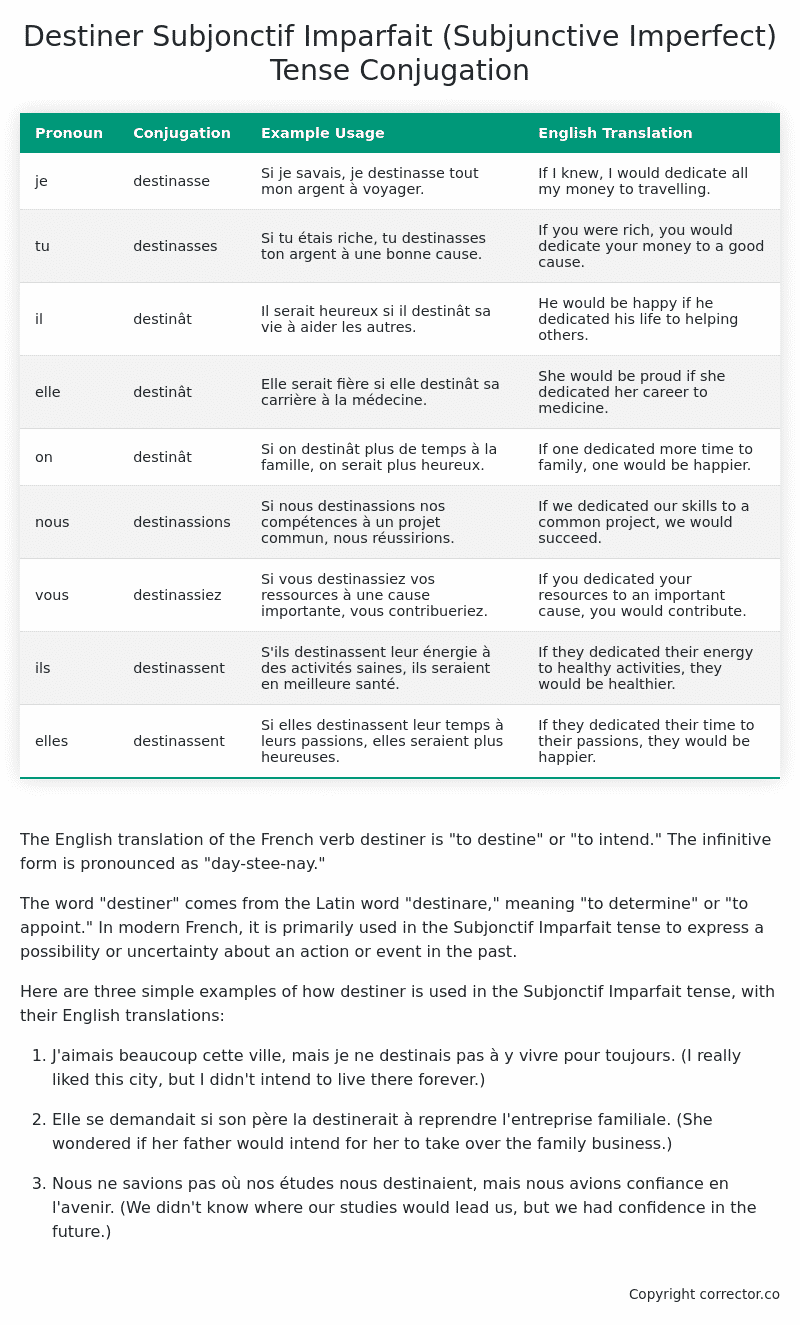Subjonctif Imparfait (Subjunctive Imperfect) Tense Conjugation of the French Verb destiner
Introduction to the verb destiner
The English translation of the French verb destiner is “to destine” or “to intend.” The infinitive form is pronounced as “day-stee-nay.”
The word “destiner” comes from the Latin word “destinare,” meaning “to determine” or “to appoint.” In modern French, it is primarily used in the Subjonctif Imparfait tense to express a possibility or uncertainty about an action or event in the past.
Here are three simple examples of how destiner is used in the Subjonctif Imparfait tense, with their English translations:
-
J’aimais beaucoup cette ville, mais je ne destinais pas à y vivre pour toujours.
(I really liked this city, but I didn’t intend to live there forever.) -
Elle se demandait si son père la destinerait à reprendre l’entreprise familiale.
(She wondered if her father would intend for her to take over the family business.) -
Nous ne savions pas où nos études nous destinaient, mais nous avions confiance en l’avenir.
(We didn’t know where our studies would lead us, but we had confidence in the future.)
Table of the Subjonctif Imparfait (Subjunctive Imperfect) Tense Conjugation of destiner
| Pronoun | Conjugation | Example Usage | English Translation |
|---|---|---|---|
| je | destinasse | Si je savais, je destinasse tout mon argent à voyager. | If I knew, I would dedicate all my money to travelling. |
| tu | destinasses | Si tu étais riche, tu destinasses ton argent à une bonne cause. | If you were rich, you would dedicate your money to a good cause. |
| il | destinât | Il serait heureux si il destinât sa vie à aider les autres. | He would be happy if he dedicated his life to helping others. |
| elle | destinât | Elle serait fière si elle destinât sa carrière à la médecine. | She would be proud if she dedicated her career to medicine. |
| on | destinât | Si on destinât plus de temps à la famille, on serait plus heureux. | If one dedicated more time to family, one would be happier. |
| nous | destinassions | Si nous destinassions nos compétences à un projet commun, nous réussirions. | If we dedicated our skills to a common project, we would succeed. |
| vous | destinassiez | Si vous destinassiez vos ressources à une cause importante, vous contribueriez. | If you dedicated your resources to an important cause, you would contribute. |
| ils | destinassent | S’ils destinassent leur énergie à des activités saines, ils seraient en meilleure santé. | If they dedicated their energy to healthy activities, they would be healthier. |
| elles | destinassent | Si elles destinassent leur temps à leurs passions, elles seraient plus heureuses. | If they dedicated their time to their passions, they would be happier. |
Other Conjugations for Destiner.
Le Present (Present Tense) Conjugation of the French Verb destiner
Imparfait (Imperfect) Tense Conjugation of the French Verb destiner
Passé Simple (Simple Past) Tense Conjugation of the French Verb destiner
Passé Composé (Present Perfect) Tense Conjugation of the French Verb destiner
Futur Simple (Simple Future) Tense Conjugation of the French Verb destiner
Futur Proche (Near Future) Tense Conjugation of the French Verb destiner
Plus-que-parfait (Pluperfect) Tense Conjugation of the French Verb destiner
Passé Antérieur (Past Anterior) Tense Conjugation of the French Verb destiner
Futur Antérieur (Future Anterior) Tense Conjugation of the French Verb destiner
Subjonctif Présent (Subjunctive Present) Tense Conjugation of the French Verb destiner
Subjonctif Passé (Subjunctive Past) Tense Conjugation of the French Verb destiner
Subjonctif Imparfait (Subjunctive Imperfect) Tense Conjugation of the French Verb destiner (this article)
Subjonctif Plus-que-parfait (Subjunctive Pluperfect) Tense Conjugation of the French Verb destiner
Conditionnel Présent (Conditional Present) Tense Conjugation of the French Verb destiner
Conditionnel Passé (Conditional Past) Tense Conjugation of the French Verb destiner
L’impératif Présent (Imperative Present) Tense Conjugation of the French Verb destiner
L’infinitif Présent (Infinitive Present) Tense Conjugation of the French Verb destiner
Struggling with French verbs or the language in general? Why not use our free French Grammar Checker – no registration required!
Get a FREE Download Study Sheet of this Conjugation 🔥
Simply right click the image below, click “save image” and get your free reference for the destiner Subjonctif Imparfait tense conjugation!

Destiner – About the French Subjonctif Imparfait (Subjunctive Imperfect) Tense
Formation
Common Everyday Usage Patterns
Interactions with Other Tenses
Subjonctif Présent
Indicatif Passé Composé
Conditional
Conditional Perfect
Summary
I hope you enjoyed this article on the verb destiner. Still in a learning mood? Check out another TOTALLY random French verb conjugation!


